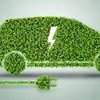Zomato commits 100pc electric vehicles adoption for its delivery fleet by 2030
Zomato will also partner with all stakeholders in the electric vehicle ecosystem to enable faster adoption of the environment-friendly two-wheelers.
On World Environment Day, Zomato — the Gurugram-based foodtech unicorn — on Saturday, announced its commitment towards 100 percent adoption of electric vehicles by 2030.
In a blog post, Zomato Founder and CEO Deepinder Goyal said, “We are joining the Climate Group’s global electric mobility initiative, EV100, and committing to 100 percent adoption of electric vehicles (EV) by 2030.”
Deepinder, in an earlier post, had noted that the foodtech startup delivers over 20 percent of the orders on bicycles, which goes up to 35 percent in crowded cities, including Delhi. These deliveries have no carbon footprint and are pollution-free.
At present, Zomato uses EVs in cities such as Delhi, Bengaluru, and Mumbai. Deepinder said, “The current EV fleet is a small fraction of the active fleet of delivery partners, and we understand that getting to 100 percent adoption of EVs will not be easy, but is essential in the long run.”

Deepinder Goyal, co-founder and CEO, Zomato
He added that the adoption rate has been low for them and the two-wheeler industry equally.
“We believe, key barriers that currently impact adoption include limited battery range, lack of charging infrastructure, higher upfront costs, and lack of trust in new technology,” Deepinder said in the blog post.
However, he said that rapid innovation in this sector and positive push by the government is likely to see a faster transition to EVs.
“We want to actively aid the transition to EVs by enabling the ecosystem — EV players, battery manufacturers, and the government. We are already actively working with a few EV players to design pilots and create business models that could facilitate a faster transition towards a viable mobility solution for deliveries,” he said.
Other companies from the digital economy segment, including Flipkart and Amazon, have also shown their commitment towards the adoption of EVs.
“We want to be accountable for the impact we create and contribute to finding solutions for the world’s most important environmental challenges, that is a by-product of our own progress,” Deepinder noted.
Edited by Suman Singh








